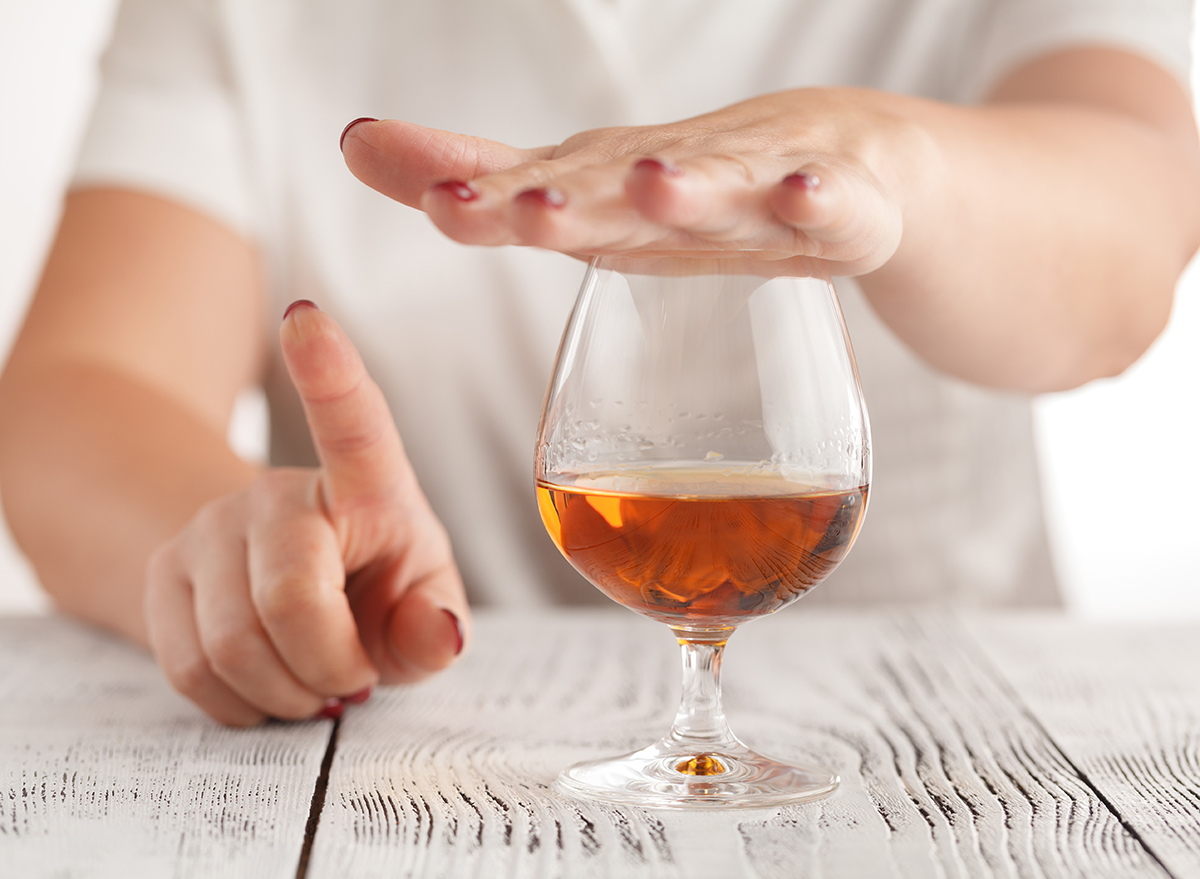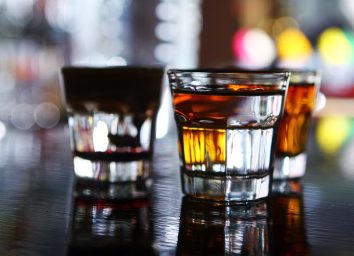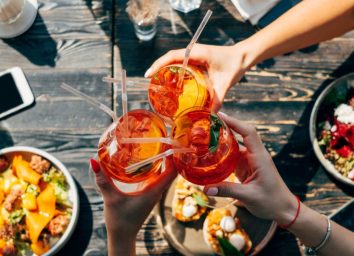Should You Stop Drinking Alcohol to Lose Weight?

For most of us, drinking goes hand in hand with socializing. Whether we're at an after-work happy hour, a wedding, or a birthday party, alcohol is usually involved. But what if that marg (or three) is the reason you can't shed those last few pounds? As it turns out, alcohol and weight loss do go hand in hand.
We asked a nutritionist about the connection between alcohol and weight control, plus how you can hit the bar and still reach your health goals.
Does the body treat calories from alcohol the same as calories from food?
Actually, no. Because the body recognizes alcohol as a toxin, it pauses its metabolism of other foods and instead focuses on getting the alcohol out of our system stat. The result? The liver has to work extra hard, and calories from the nachos that you ate with your beer are more likely to get stored as fat instead of burned for fuel. Womp womp.
How many calories are in alcohol?
Alcohol is the second most caloric macronutrient, says Sydney Greene, RD, a New York City-based nutritionist. One gram of alcohol contains 7 calories (for reference, one gram of fat contains 9 calories, while proteins and carbs contain 4 calories per gram). "Alcohol also contains zero nutrition for our body, so 100 calories from alcohol is not the same as 100 calories from broccoli," says Greene. "We can burn the broccoli for fuel and utilize it for hundreds of enzymatic reactions in the body; alcohol not so much."
So essentially, one 5-ounce glass of wine contains about 120 calories, while the average 12-ounce beer serves up around 150 calories. Mixed drinks can contain anywhere from 100 calories (think: a vodka soda) to more than 500 calories (hi, frozen margs), plus a full day's worth of sugar.
Does drinking always lead to weight gain?
Binge drinking—aka drinking five or more drinks in one sitting—and heavy drinking (more than four drinks per day for men and more than three drinks per day for women) have both been linked to a greater risk of obesity. Even drinking in moderation may be associated with a higher percentage of body fat, per a 2015 review published in the journal Current Obesity Reports.
Higher intakes of alcohol are also associated with increased risks of chronic diseases, including fatty liver disease, heart disease, ulcers, and type 2 diabetes, says Greene. Current guidelines recommend no more than one drink per day for women and no more than two drinks per day for men to keep risk factors in check. And no, that's not the same as staying dry during the work week and having five drinks on Saturday night (sorry).
How else might alcohol influence my weight?
Alcohol dehydrates you—and that can have a serious impact on your diet.
"The combination of alcohol's diuretic properties and the lack of water consumed during drinking episodes is the perfect storm for dehydration," says Greene. "When someone is dehydrated, they will likely feel more fatigued, which can lead to increased consumption of high-sugar and high-carbohydrate foods for a pick-me-up." What's more is that it's easy to confuse dehydration and hunger, so plenty of people reach for food instead of fluids after a night out.
Contrary to popular belief, those late-night fries you suddenly start craving won't help your hangover (or your waistline).
"There is zero scientific evidence to support greasy Thai food or McDonald's cheeseburgers [for hangovers]," Greene tells us. "If anything, opt for eggs the next morning, as they contain the amino acid cysteine, which breaks down acetaldehyde, a byproduct of alcohol."
Drinking can also mess with our sleep schedules and mood, both of which have profound effects on food choices.
"The body's efforts to metabolize alcohol throughout the night affects our ability to enter a REM state, leading to an overall poorer night's sleep," says Greene. "Studies show that even a one-hour reduction in sleep can increase our calorie consumption in a day by about 500 calories."
Because alcohol is a depressant, it can also alter your mood not only while you're at the bar, but also for 6-48 hours after drinks, says Greene. "It's common to feel anxious, sad, overwhelmed, or alone after drinking episodes, and for some, this ignites a desire to eat as a way to cope."
I'm not ready to ban booze entirely, but do want to shed a few pounds. How much—and what—should I drink?
Well, that all depends on how much you currently drink. "I recommend anywhere from 6-10 drinks per week, with 4 drinks per week being the ultimate goal," says Greene. "Treat fruity or creamy cocktails as desserts and keep beer to a minimum, about two per week."
Opt for clear liquors and order them on the rocks with lime. If you're adding a mixer, choose soda water over tonic water. "Most people aren't aware that tonic water can contain the same amount of sugar as a can of soda," says Greene.
Also smart: stick to a 1:1 ratio of alcohol to water, meaning you won't order another glass of wine until you finish a glass of water. You'll thank us in the morning.








